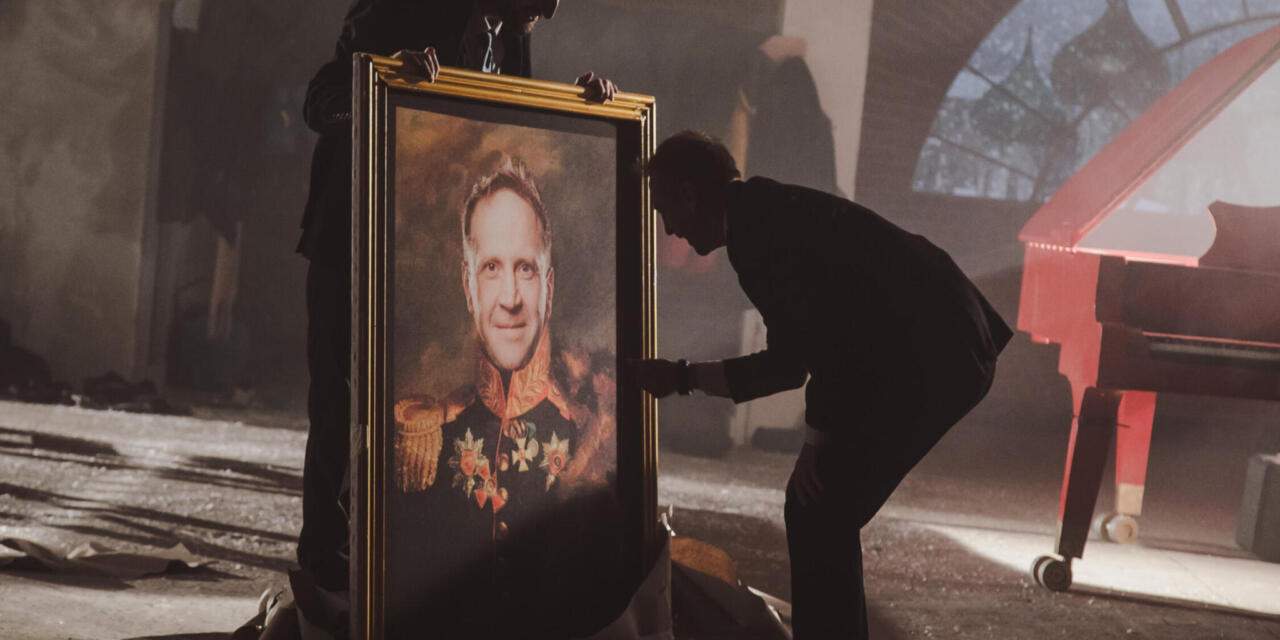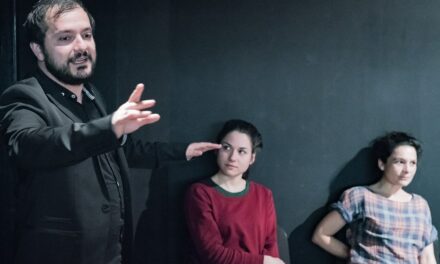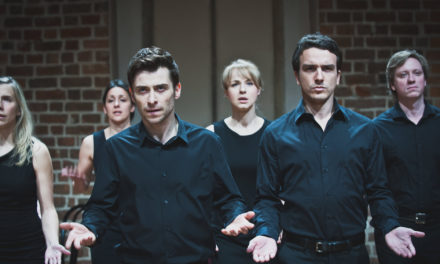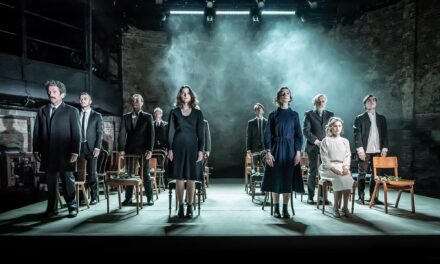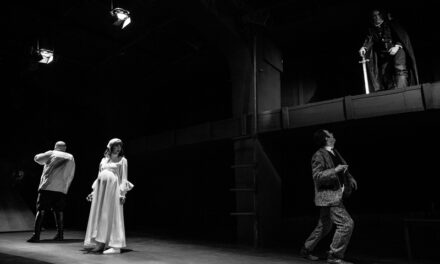Dmitry Krymov: artist, director, stage designer, teacher. The son of two of the great theatrical figures of the twentieth century, Anatoly Efros and Natalia Krymova, he started out working as a set designer on his father’s plays in Moscow theaters (Malaya Bronnaya Theatre, Mayakovsky Theater, the Moscow Art Theater, and the Taganka Theater). For many years he headed the Laboratory of the School of Dramatic Art Theater. He is a multiple winner of Russia’s Golden Mask award and of many international theater festival awards as well.
The past two seasons have been particularly fruitful for Krymov. Moscow premieres followed one after another: Everyone Is Here at the School of the Modern Play Theater (October 10, 2020), Don Juan. Dress Rehearsal at the Pyotr Fomenko Workshop Theater (April 29, 2021), Kostik at the Pushkin Theater (September 6, 2021), and Two at the Museum of Moscow (September 28, 2021). Many plans have been put in place for the coming years. A production of The Cherry Orchard at the Wilma Theater in Philadelphia was scheduled last year. On February 24, the war began. The next day, Krymov took off on a Moscow–New York flight, coming to the United States to work on the play. The premiere took place on April 14. The play was performed with great success for almost a month; theatergoers all over the world had the opportunity to watch it online.
I have long dreamed of talking with Dmitry Anatolyevich. Thanks to the Stage Russia project, I saw film versions of his plays Boris and Everyone Is Here. I talked about Boris with the lead actor Timofey Tribuntsev, and about the play Everyone Is Here with actress Maria Smolnikova. Our conversation with Dmitry Krymov took place at the end of May. I did not ask the director direct questions about the war; those wishing to hear his opinion I refer to his [Russian-language] interview with the Voice of America journalist Anna Nelson. This topic is difficult for him; “it hurts a lot.” Our conversation began with something else—his recent US production of The Cherry Orchard.
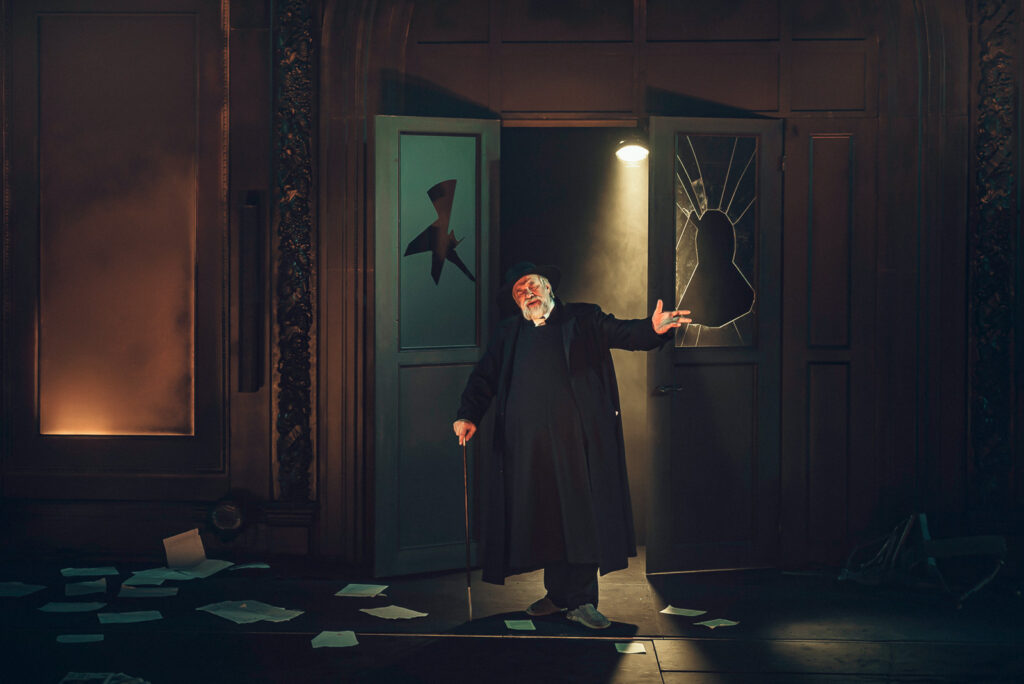
“Everyone Is Here,” dir. Dmitry Krymov at the School of the Modern Play in Moscow. Filmed for Stage Russia. Photo by Yury Bogomaz.
ELKIN: I always thought of Chekhov as a peacetime writer. He talks about dramas in civilian life. People “dine, just dine, and at that time their happiness is being built up and their lives are being shattered”—this is Chekhov. During wartime one stages Schiller, Shakespeare, but not necessarily the drama of everyday life. It seems that no one has succeeded before you. You probably thought about this during rehearsals: how to stage Chekhov during the war…
KRYMOV: It seems to me that Chekhov has been staged during wartime, and there have been these “peaceful” performances during monstrous events. Such performances are needed by the audience. The First Studio of the Moscow Art Theater opened in 1914 with Cricket on the Stove when the First World War had just begun. Witnesses say that people came to the performance and completely immersed themselves in it. If the theater is to some extent a reflection of life, a mirror or a magnifying glass, then the unreality of what is happening now must be refracted in it. It’s the same with cinema, with any art created at this time… I haven‘t found the wording for it for myself yet. The electrification of the nervous system goes off scale. You can put on something about love, you can put on a fairy tale, but it should be clear that the performance was created today, for those people who see the same news as you. It wouldn’t matter whether I staged Little Red Riding Hood or Chekhov. I tried to let the air that I inhale be exhaled through the play, and every day I inhaled the same thing that we all do.
ELKIN: I like to try to solve Chekhov‘s riddles. There is a moment when Ranevskaya hears the sounds of music, she listens, and Gaev says to her: “This is our famous Jewish orchestra. Remember, four violins, a flute, and a double bass.” Ranevskaya’s remark: “Does it still exist?” Why did Chekhov need a Jewish orchestra? A part of life departing? It seems that the nobles did not invite Jewish orchestras to their homes.
KRYMOV: How interesting. Life is changing, moving forward. Probably, indeed, the nobles did not invite Jewish orchestras to their homes, but for me that does not matter so much as the fact that the sadness that exists in Jewish music remains forever. I think Chekhov jumped over the realities of his time. If you want to mourn, say goodbye to the cherry orchard, then you can’t beat a Jewish orchestra.
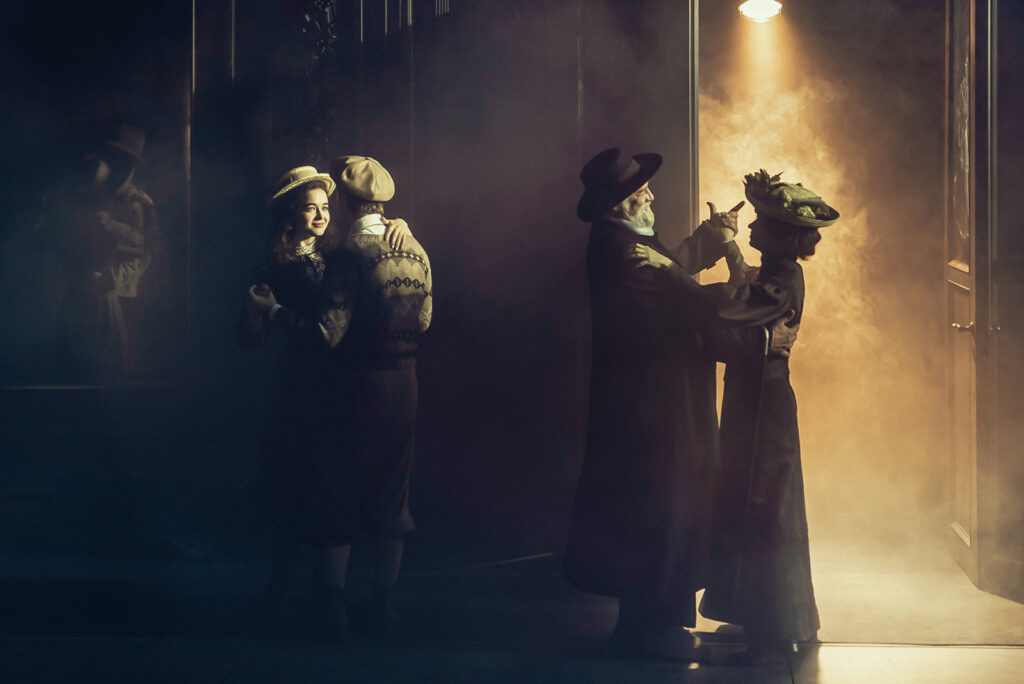
“Everyone Is Here,” dir. Dmitry Krymov at the School of the Modern Play in Moscow. Filmed for Stage Russia. Photo by Yury Bogomaz.
ELKIN: I would like to ask you about the play Everyone Is Here at the School of the Modern Play Theater and talk about your father’s legendary dramaturg Nonna Mikhailovna Skegina. In the performance, she, played by Maria Smolnikova, puts the emphasis on the second syllable—Efros. Which is correct: Efros or Efros?
KRYMOV: Nonna Mikhailovna stressed the second syllable like a strict teacher. I don’t think there are any rules. On my father’s fiftieth birthday, the wonderful Zinovy Paperny performed at the House of Scientists. He said: “Fifty percent of our docents say Efros, and fifty percent of our docents say Efros.”
ELKIN: We know that Nonna Mikhailovna idolized Anatoly Vasilyevich. And how did she feel about your work, what did she say about your plays?
KRYMOV: As far as I remember, she was skeptical at first, but those who knew me as a child find it difficult to digest what I have become. In terms of the seriousness of the relationship. But then something broke. I don’t remember when it happened, but in recent years it was a very serious, loving relationship without skepticism, like: “Well, Dimka botched it up there.” The fact that I allowed her to play a joke on me in performance is my loving nod to her. I bow my head to her. When she died and we saw her off, she was in her golden jacket. I knelt down and began to speak in front of her coffin: “Nonna, you are a queen.” It was all in her: spitefulness and fury. Now I miss her terribly, with her maximalism, her certainty, sometimes wrongfully, but now it doesn’t matter at all […] Four years ago, when I didn’t know whether I should leave the School of Dramatic Art, I called her and asked for advice. She said, “Quit.” That was a monstrous summer, a couple of months before her death. My wife was not at home. When she returned, I said: “That’s it, I called Nonna, she said: ‘Quit.’” I’d been given the green light.
ELKIN: What a bitter parallel! Efros lost his only theater and never found it again. And you lost the School of Dramatic Art, your home theater (to use the terminology of Lev Dodin), and now you wander around theaters as a guest…
KRYMOV: Yes, a “home” theater is over for me. I won’t create one again. It requires great effort, faith, love, desire. And since I have neither the strength nor, most importantly, the belief that this will not turn into what it was, it is not worth starting. Now I am a guest everywhere.
ELKIN: Have your plays remained at the School of Dramatic Art?
KRYMOV: Two remain, taken under the wing of producer Leonid Roberman, with whom I made Boris Godunov […] and Two. All the rest, a nice woman […] threw out.
ELKIN: Could you imagine the unprecedented freedom that opened before you?
KRYMOV: You have to pay for freedom. Taking Ukraine as an example, this is now obvious. They need freedom.
ELKIN: Let’s imagine an ideal situation. You receive an offer to head a preexisting theater…
KRYMOV: This is far from an ideal situation. This is a very difficult situation. What would I do with actors I haven’t chosen? I would have to serve them. I am, in general, an egoist. I need actors to serve my idea, to get pleasure and joy from it. And to serve actors who worked before me and will work after… I’m afraid of this. I don’t want this. I want to do my plays with people I have chosen. […]
ELKIN: In the case of the play Everyone Is Here, do we all need to thank Joseph Reichelgauz [of the School of the Modern Play Theater]?
KRYMOV: Yes, for many years he offered me something to do in his theater, but this time I could not refuse, because he offered to do a play about my dad… […]
ELKIN: In Everyone Is Here you reminisce about your youth, your parents. Why, in the credits, did you kind of hide behind the word “Director”? If the Director says “mom” and “dad”, why not call him what he is—Krymov?
KRYMOV: I didn’t think about it somehow. Stepped back a bit, right? It would have pissed me off. There’s a director in many performances. For Wilder, this is the stage manager, but also the director […] There is some kind of cunning duality here, based not on my decision, but on a feeling that I did not even define for myself. It’s all a pretty conventional spectacle. And even though Nonna talks about my dad as about Efros Anatoly Vasilyevich, my dad never wore such clothes or such a hat; my mother didn’t look like that at all; they never danced; in any case, I never saw them… There was nothing like that. One of my friends said: “It’s good that you didn’t do a documentary play. This one smells of youth.” Probably, somehow intuitively I was more interested in it […]
ELKIN: I liked the quote from Lev Rubinstein: “And my groundhog is with me.” What is this, a nod to your favorite author?
KRYMOV: Yes, he is my favorite writer. He wrote special texts for two of my plays. “Groundhog” is one of my favorite texts. From the poem “Mom washed the window.” […]
ELKIN: Your actors miraculously manage to balance on the verge of tragedy and farce. Do you spell this boundary out for them, or is everything clear to the actors without additional words?
KRYMOV: Not everyone understands, but those who do, do it during rehearsals. It’s not like I say: “OK guys, we’re working according to the rule ‘tragedy-farce.’ This is where one ends and the other begins.” There are people who don’t take to it. After all, I work in different theaters with different groups… I worked… Now, if I continue, I will do the same. The actors are new. Almost everyone except Masha. Among the new you come across amazing actors of the same blood type who understand this style. […]
ELKIN: You have a team of smart actors in your performances. Does an actor have to be smart, or is it enough for him to be “plasticine” in your hands?
KRYMOV: One does not exclude the other. Being a smart actor means understanding that you are good “plasticine” and believing in the “sculptor,” adding something of your own. But you shouldn’t use the mind to replace the organic matter and the childlike pleasure in what you are doing, and the readiness to jump right and left. The willingness, like a child, to jump into the sandbox under the direction of the director.
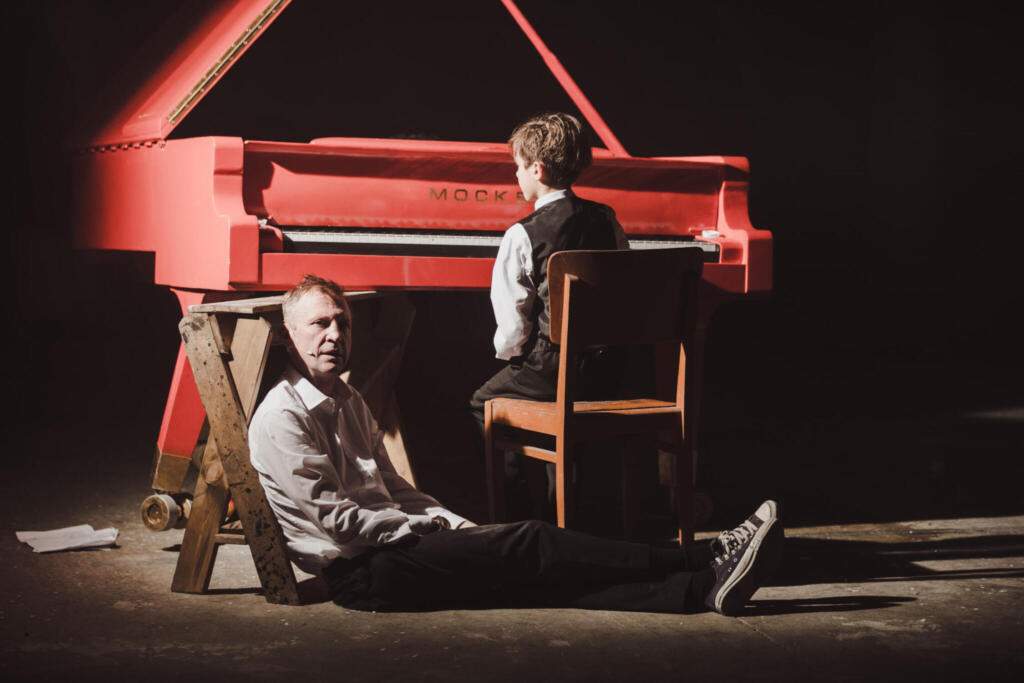
“Boris,” dir. Dmitry Krymov at the School of the Modern Play in Moscow. Filmed for Stage Russia. Photo by Ksenia Ugolnikova.
ELKIN: Do you accept improvisatory acting?
KRYMOV: Absolutely. There is a big piece of work where that is exactly what is needed. I need to start a mechanism for everyone to improvise.
ELKIN: Is it free or rehearsed improvisation as part of your directorial concept?
KRYMOV: It is rehearsed as a game, and in any game surprises are possible. Football can’t be rehearsed. There are strict rules and a clear goal, but the question is how to achieve this goal… But in football, each game is very different from the next, and here more subtle mechanisms of difference are in play. They are there every time. There must be life, not strict memorization. Otherwise, it is not a game, but mere imitation of one. It’s like musicians. Oistrakh plays the violin according to the notes. He gets used to these notes, lives in them, expresses himself through them. This learning enters his blood and becomes him, but later individuality, freedom, and understanding of the goals of the game, which are higher than learning, are included. Someone might slip into it. For example, Mikhail Chekhov allowed himself to do this: just like that—and he did it in a different way, right at the performance. This is a dangerous path, but true creativity.
ELKIN: Your performances are always different, they can be reviewed several times…
KRYMOV: The audience is important. Different audiences give a different air to the performance. Sometimes the actors fight the audience, sometimes they swim in its love, sometimes the audience is indifferent and the actors don’t know what to do. They go backstage, there is a pained expression on their faces, as if they are doing something wrong. I reassure them: “You are doing everything right, but today there is such an audience.” […] Actors see the hall and feel the audience. A good actor is able to be inside the role and inside his improvisation, but at the same time see and feel the audience. This is a complex combination of involvement in the work. The actor simultaneously serves several gods and at the same time the main god. He serves me, the public, himself and his vanity, the desire to please, and, most importantly, the task that was agreed on at the very beginning and which he adamantly performs. When you look at this from behind the scenes, you feel delight. As in jiu-jitsu—the highest, black belt.
ELKIN: The performance is done. The premiere is over. What’s next? A period or an ellipsis?
KRYMOV: Until a certain point, an ellipsis. Then I put a period and never again watch the play. But the ellipsis phase lasts for some time. First, I am afraid that the laws according to which everything is built are not strong enough and can easily be violated, even by accident. I have to watch out for this. Second, it is simply impossible for me to immediately leave the acting company where I spent so much time. To stage and go—it’s somehow vulgar. I stay with them out of a sense of brotherhood. […]
ELKIN: What is the fate of your first feature film, Everything Is OK?
KRYMOV: It’s finished. Now the post-production period is underway. What will happen next, I don’t know. Now not a single Russian film festival wants it. [The producer] Pasha Lungin and I are thinking about this topic. […] We will stand in the supermarket and sell cassettes.
ELKIN: Maybe they will make an exception for you? A film by Kirill Serebrennikov was just screened at Cannes…
KRYMOV: I doubt it. Kirill has long-standing connections… I myself would not go to such a hot frying pan. I’ll be glad if the film is simply seen. My first film. I was fascinated by the production itself. It seems like I can do it. Pasha looked at how I pasted and edited the film, was impressed, said: “Let’s bring it to the festivals.” But then everything went haywire. […] I’m not very interested in this “they accept it—they don’t accept it” discussion. I would like the film to be watched and have something said like: “Guys, what nonsense are we talking about? How can Russian art be swept off the table when it’s good?” But since even Pushkin and Gogol are not defensible now, I don’t anticipate such a scenario, so why go into the oven? I just hope the film doesn’t sit like Askoldov’s Commissar for decades on a dusty shelf.
ELKIN: Would you want to shoot anything else?
KRYMOV: Of course, I would love to. I can’t imagine how. Now, to be honest, I do not see the physical possibility of continuing this activity. In any case, connected with Russia. And in the West, who will take me? “Two worlds—two Shapiros.” [Idiom referring to an unbridgeable cultural gap. -Trans.]
ELKIN: How do you feel about film versions of your plays?
KRYMOV: […] I haven’t watched many film versions of them, but I liked the way Boris Godunov was filmed. A stranger filmed it with three cameras. He changed shots very quickly. A shot did not last more than three seconds. There was an interesting feeling. Recently, the play Don Juan. Dress Rehearsal was filmed for the Golden Mask festival. I agreed with the director that [lead actor] Tsyganov […] would constantly be followed by a cameraman. He’s on stage and the camera is behind him. If he runs into the camera—it’s okay, such an aesthetic… It turned out very lively. Not like usual.
ELKIN: Your dad worked twice at the Guthrie Theatre in Minneapolis. In the 1978–79 season, he staged Gogol’s Marriage, and the next season he staged Bulgakov’s Molière. For you, The Cherry Orchard also became your second experience in America. The first was Yale University, six years ago. How did you find working with American actors?
KRYMOV: My dad was very impressed. The second play was somehow more difficult, but the first one was just happiness. Mutual happiness. And I had a great time in Philadelphia. There are very good people and very good actors there: they sympathize with both the theme of the performance and me, a person who experiences what is happening more acutely than they do. They have the gift of empathy and compassion.
ELKIN: Are there differences in the way Russian and American actors approach their roles?
KRYMOV: None. In my opinion, it was not difficult for them to understand what I was offering them, and I was pleased that they were so responsive and that we were moving somewhere together. They have amazing responsiveness and recoil power. Like a faucet that opens not gradually, but immediately to the fullest. It was amazing.
ELKIN: Do you think your collaboration will continue?
KRYMOV: I don’t know. I would love to visit them again. There’s a wonderful atmosphere there. Stage manager Pat Adams is fabulous! A female ship captain. Discipline with an iron fist. Kind, strict, and affectionate… The whole team was very good… I am prepared to work in American theaters in the future. The question is where and with whom. […]
ELKIN: Have you ever been to Chicago?
KRYMOV: I have been, but not for work. I had a friend who lived there, a wonderful woman. […]
ELKIN: You once said in an interview that you don’t really like the expression “political theatre.” At the same time, for me, the play Boris is a vivid political statement about power, and in The Cherry Orchard, you directly talk about the war between Russia and Ukraine. What is the difference between political and just performance?
KRYMOV: I am not against political theatre. It’s just not my style… It’s just words. Shostakovich has The Anti-Formalist Rayok, a political work that he wrote without any prospect of publication, out of anger and rage at what was happening. Of course, it was impossible to perform it during his lifetime. A parody of Stalin, Kaganovich, Molotov, Zhdanov. And there is the Thirteenth Symphony of Babi Yar—”There is no monument above Babi Yar…” An amazing symphony. Political? Well, no. And the Seventh Symphony, which is written to the psalms of David, is it political? No. But on the other hand, of course, it is political. The air is saturated with politics, which, unfortunately, dictates our lives. This is a dough that needs to be digested, and sometimes there are bones in the minced meat. It’s as if it’s not on purpose—there just was such a meat grinder. I once did a play; my friends watched it and said: “This is not your style. You are usually kind, but here you are some kind of evil.” Listen, I am many things: I can be both evil and kind. I wrote a play when I was very angry, and I know it, and I won’t hide it. It’s the same with politics. Politics, unfortunately, is always in Russian life. Even without the cataclysm that is happening now. It is genetically absorbed into us, as Pushkin was absorbed into us. It’s still the air where everything that happens in literature, theater, cinema takes place. It’s the clay that is scooped from the clay pot of Russian life. […]
ELKIN: Back to Chekhov, with The Cherry Orchard everything is clear, but for me Everyone Is Here is a very Chekhovian play. Anton Pavlovich himself, the other characters, the mood, even Anatoly Ivanovich’s grandfather’s chair with the abbreviation VKPB carved on the leg. I quote the Director: “Under it once stood a suitcase with children’s toys.” This is Gaev’s “dear, respected closet” from The Cherry Orchard…
KRYMOV: I didn’t think about it, but of course, of course…Thornton Wilder is such an American Chekhov. That’s right, people “dine, just dine, and at that time their happiness is being built up and their lives are being shattered”…
ELKIN: Here we have looped our conversation. And you are plunging into the past, like Emily from Our Town, and like Chekhov’s heroes. And again we stumble over the topic of war. Can the past be made into the present? Will everything be the same after the war as it was before?
KRYMOV: Unfortunately, I have no answers, but I have faith that it will be.
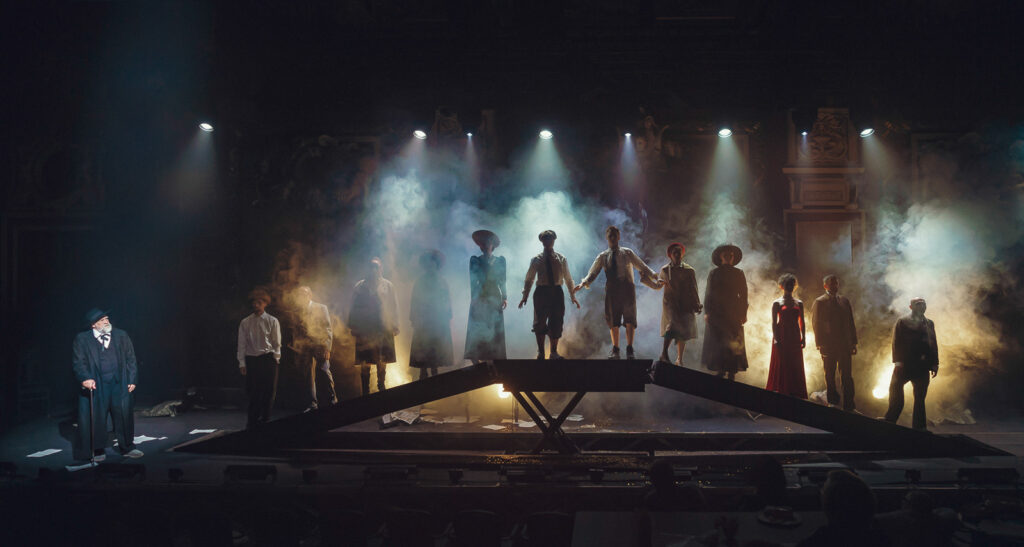
“Everyone Is Here,” dir. Dmitry Krymov at the School of Modern Play in Moscow. Filmed for Stage Russia. Photo by Yury Bogomaz.
ELKIN: Remember the lines of Shpalikov: “Never return to your former places. Even if the ashes look quite tempting, You will not find what you are looking for, Neither you nor me”? Everyone Is Here tests this Shpalikovian formula, and soon we will all face it. Is it possible to return to the old life, to the one that existed before February 24? As [is said to] Wilder’s Emily, “You [will] not only live it but also watch yourself living it”…
KRYMOV: Chekhov and Wilder touched on some basic life threads that lie on the surface (Chekhov was accused of writing everyday life), but at the same time they are revolutionary. Chekhov is one of the greatest revolutionaries in art. That’s why we’re drawn to him all the time. In his four main plays—probably in Ivanov too, but this play is somehow less close to me—we see the destruction of life. Life is crumbling like a sandcastle on the seashore. Nevertheless, people want to live, they want comfort, they want to drink tea. Even if their fates are being decided at this time…Now it’s even blasphemous to say that this will pass, but it will drag on… It will drag on… If someone survives… If even ten people survive, a table will still appear on some island and people will start drinking tea and life will begin again. A new life.
Filmed versions of Dmitry Krymov’s Boris and Everyone Is Here are available for streaming on the Stage Russia website.
Translated from the Russian by Rose Fitzpatrick. This article was originally published by the Russian-language newspaper Reklama. It is reposted here in a translated and abridged form with the permission of the author. To read the original article, click here.
This post was written by the author in their personal capacity.The opinions expressed in this article are the author’s own and do not reflect the view of The Theatre Times, their staff or collaborators.
This post was written by Sergey Elkin.
The views expressed here belong to the author and do not necessarily reflect our views and opinions.

